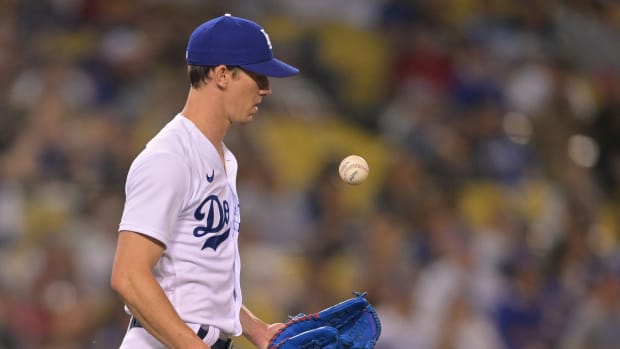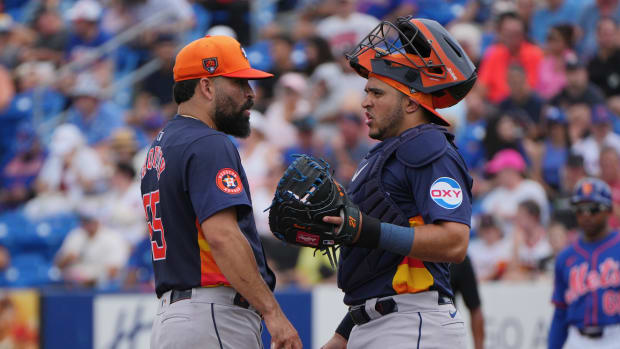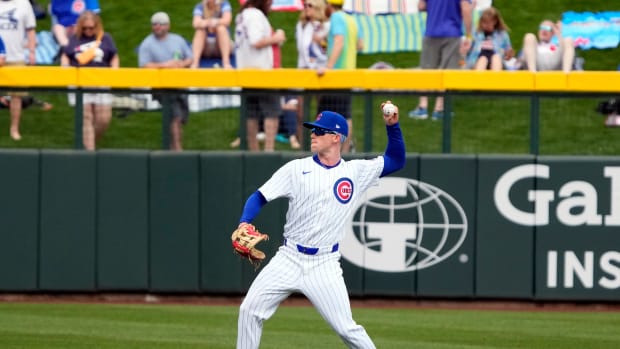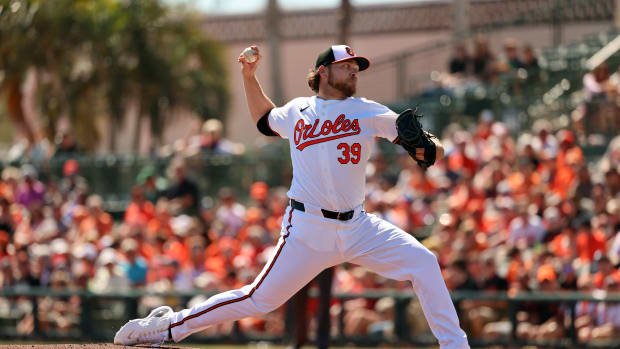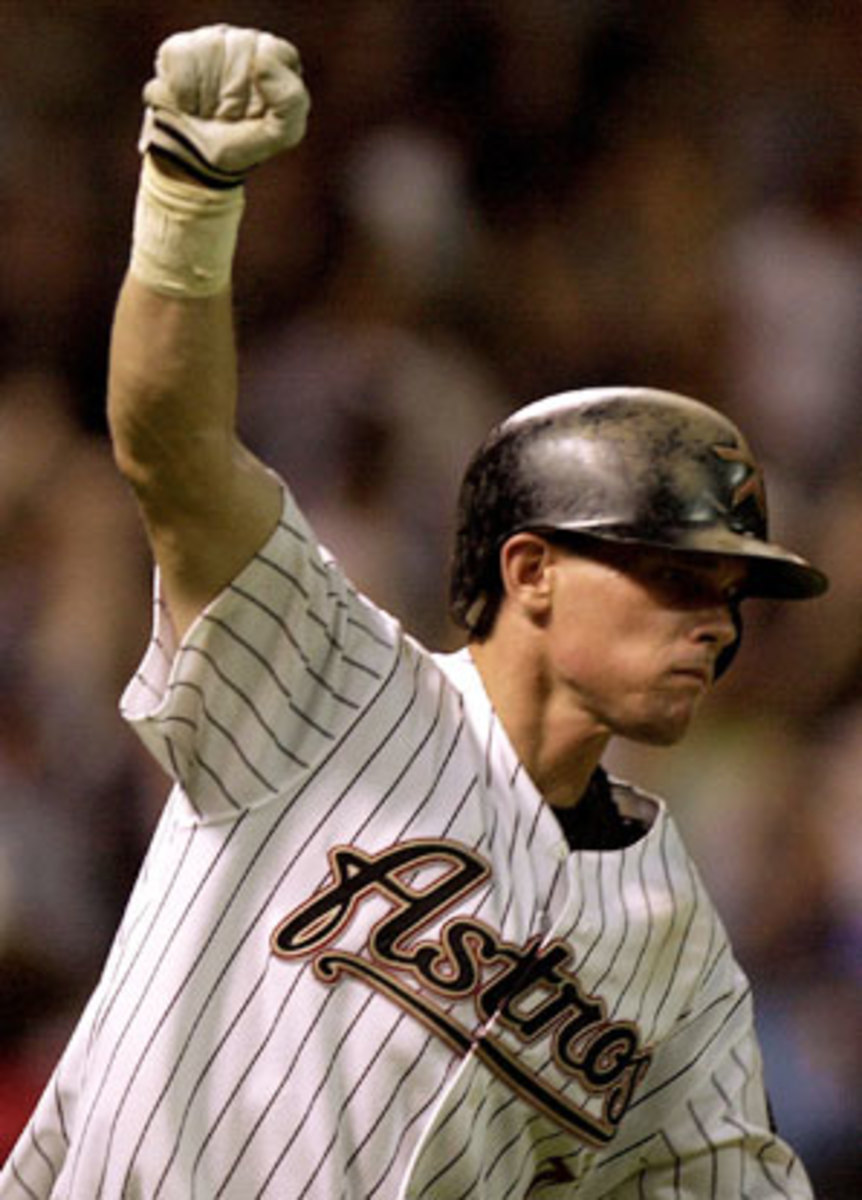
The Hall of Fame waiting game
Craig Biggio may be the only person to gain election to the Hall of Fame this year. (AP)
For all of the controversy and verbiage regarding this year's Hall of Fame ballot, there exists the very real possibility that none of the 37 players will muster the necessary 75 percent to gain election, which would result in the first BBWAA vote shutout since 1996. Between the unusually large slate, differing opinions over how to handle candidates linked to performance-enhancing drugs, general first-ballot squeamishness and an old-school/new-school split with regards to sabermetrics, it appears that no player has as overwhelming a consensus as he may need, at least according to the two widely recognized online straw polls. Of the 114 ballots tracked by the Baseball Think Factory's 2013 Hall of Fame Ballot Collecting Gizmo, no candidate has more than Craig Biggio's 67.5 percent, while both Biggio and Raines have 69.4 percent of the 85 individual ballots tracked by the blog The Girl Who Loved Andy Pettitte.
The BTF sample represents almost 20 percent of last year's vote total; if the same number of ballots were cast as last year (573), Biggio would need to bring home 76.9 percent of the as-yet-unreported ballots. That's not an impossibility for a player with the near-automatic marker of 3,000 hits, but it's no guarantee either. The other candidates polling above 50 percent — Jeff Bagwell (65.8 percent), Mike Piazza (63.2 percent), Tim Raines (62.3 percent) and Jack Morris (61.4 percent) — would all need somewhere in the 77-78 percent range from the outstanding ballots. Again, not an impossibility, but perhaps less likely given that none of them has a similar milestone marker. Roger Clemens and Barry Bonds, who are both polling at 44.7 percent there, would need 82.5 percent among the unreported votes, which in this polarized environment clearly isn't going to happen.
Based upon current reports, what follows is a quick prognosis for the candidates, listed in order of the results from BTF. Note that I've covered each one's merits at length over the past month, and reiterated the top candidates' merits in brief with regards to my virtual ballot, so I won't spend the space here flogging those same horses.
Biggio: As I noted at the outset of my JAWS series, Biggio represents the most likely to be elected based upon his 3,000 hits and lack of any credible PED-related suspicion. Among modern candidates with 3,000 hits, only the PED-tainted Rafael Palmeiro has failed to gain first-ballot entry; Pete Rose was banned for life before he officially reached the ballot. Even so, this could be play-at-the-plate close this time around. With the memory of Biggio's protracted march toward the milestone perhaps a bit too fresh in the minds of voters, he could fall short, though his boosters can still take heart; in modern voting history (since 1966, when the BBWAA returned to annual balloting), the highest percentage ever received by a first-year candidate who fell short was Roberto Alomar's 73.7 percent, and he sailed in easily in his second year of eligibility.
Bagwell: Though the PED whispers are still out there, Bagwell's merits appear to be winning voters over gradually. Of the candidates to receive between 60 and 74.9 percent in their third time on the ballot — Robin Roberts (72.7 percent), Roy Campanella (69.9 percent), Early Wynn (66.7 percent), Don Sutton (63.8 percent) and Phil Niekro (62.2 percent) — Roberts and Wynn went in the next year, while Campanella, Niekro and Sutton took two more years.
Piazza: Despite some amount of PED whispers, Piazza appears poised for a strong debut, if not one that garners him first-ballot entry. Of the nine players debuting with 60 to 74.9 percent of the vote since 1966, catchers Yogi Berra (67.2 percent) and Carlton Fisk (66.4 percent) were both elected the next year. That any voters considered either of those two — a three-time MVP and pillar of a dynasty on the one hand, and an 11-time All-star who set home run and longevity records at the position on the other — unworthy of first-ballot entry says more about voter idiocy when it comes to the first-ballot distinction than anything else. The same is largely true for Piazza, who is simply the best-hitting catcher of all-time.
Raines: Among the 13 holdover candidates, none appears poised to make a bigger gain than Raines, who received 48.7 percent of the vote in 2012, his fifth year on the ballot. At this point the question is when, not if, he'll get in, though that could still take a bit of time; the three modern candidates to receive 60 to 74.9 percent of the vote in their sixth year (Tony Perez, Hoyt Wilhelm and Don Drysdale) needed an average of three more years to go over the top.
Morris: Though he leaped from 53.5 percent in his 12th year on the ballot to 66.7 percent in his 13th, Morris is finding the last mile to be a hard one; he doesn't appear to be making the kind of breakthrough likely to send him over the top this year. Bert Blyleven, the last starting pitcher to be elected, went from 62.7 percent in year 12 to 74.2 percent in year 13 to 79.7 percent in year 14. While Morris' boosters had hoped he would follow that pattern, he may instead follow that of Jim Rice, who needed all 15 years of eligibility to gain entry, going from 63.5 percent in year 13 to 72.2 percent in year 14 to 76.4 percent in his final year. The alternative is the company of Nellie Fox and Enos Slaughter, who needed to wait for entry via the Veterans Committee after failing to garner that last handful of votes in their final year of eligibility.
Bonds and Clemens: While their failures to gain first-ballot entry will be held up by some as a significant rebuke of their individual merits and of all PED-related candidates, neither of these two is being equated with Palmeiro — the lone candidate on the ballot to fail a steroid test — or Mark McGwire, both of whom have failed to garner even 25 percent of the vote in their times on the ballot. Since 1966, 24 candidates have debut above 40 percent, and the only ones who have failed to gain eventual entry via the BBWAA vote are Lee Smith (42.3 percent debut), Bagwell (41.7 percent) and Steve Garvey (41.6 percent); the first two are still on the ballot, while the latter lasted the whole 15 years without making it and didn't have anywhere near the merits that Bonds (seven MVP awards) or Clemens (seven Cy Young awards) or both (standings at or near the top of several key statistical categories) did.
Edgar Martinez: In his fourth year of eligibility, his candidacy appears to have stalled at least somewhat; he's polling at 38.6 percent according to BTF, which would be a gain of just over two percentage points from last year. Among the candidates receiving between 33 and 45 percent of the vote in year four are some who eventually gained entry (Rice, Goose Gossage, Luis Aparicio), some who needed the VC (Slaughter and Johnny Mize), and some who didn't make it (Garvey, Gil Hodges and Maury Wills).
Alan Trammell: Trammell climbed from 24.3 percent in his 10th year of eligibility to 36.8 percent in his 11th, but he doesn't appear to be maintaining that momentum; in this, his 12th year on the ballot, he's at 38.6 percent along with Martinez. No modern candidate who has been that low that late has gained entry via the BBWAA, though Fox, Ron Santo, Richie Ashburn and Bill Mazeroski did so via the VC.
Curt Schilling: Currently polling at 37.7 percent in his first year of eligibility, Schilling looks like anything but an automatic selection. Of the 10 modern candidates to debut with between 30 and 40 percent, only Gossage, Eddie Mathews and Lou Boudreau were eventually elected by the BBWAA, while Slaughter, Pee Wee Reese and Jim Bunning needed the VC and Martinez, Wills, Al Lopez and Luis Tiant are all on the outside looking in. I'd guess that once 300-game winners Greg Maddux, Tom Glavine and Randy Johnson — who become eligible in the next two years — gain entry and Morris is off the ballot, Schilling will come into stronger focus and begin climbing.
Lee Smith: Smith appears to have been hurt the most by this year's new candidates; having reached 50.6 percent last year, his 10th of eligibility, he's polling at 37.7 percent this year. If that holds, that leaves him in VC-or-bust territory as far as modern candidates go.
Dale Murphy: Despite the high-profile efforts of his children to call attention to his merits, he's polling at just 20.2 percent in his final year on the ballot, and would need around 89 percent of the outstanding ballots to gain entry. That's not going to happen.
McGwire, Palmeiro and Sammy Sosa: Polling at 16.7, 15.8 and 14.9 percent, respectively, this trio is in PED-linked purgatory, though they at least appear likely to remain on the ballot for awhile. Once Bonds and Clemens gain entry, resistance to other PED-linked candidates may soften somewhat, but it does appear that far fewer voters are otherwise convinced of this trio's merits.
Fred McGriff: After receiving 23.9 percent in his third year of eligibility, the Crime Dog appears likely to take a hit, as he's polling at just 15.8 percent this year. In the modern annals, no player receiving that low a share in his fourth year has gained entry via the BBWAA, though a few — including first baseman Orlando Cepeda — have done so via the VC.
Larry Walker: Like McGriff, he's poised for a staggering blow to his candidacy; after receiving 22.9 percent in his third year of eligibility, he's polling at 14.9 percent this year. He can look to the rallies by Blyleven (17.4 percent in year three) and Aparicio (12.0 percent) for some glimmers of hope, but it's getting late early for him.
Don Mattingly: He hasn't seen 20 percent of the vote since 2002, and he may not make it until year 15. After receiving 17.8 percent in his 12th year of eligibility in 2012, he's polling at 7.0 percent, putting him in significant danger of falling off the ballot — if not this year, then next year.
Kenny Lofton: Despite being a borderline candidate on the sabermetric merits — he's below the JAWS standard among centerfielders, but above the median score and among the top 10 at the position — he's in very real danger of falling off the ballot after his first year of eligibility, à la Bobby Grich and Lou Whitaker. BTF has him at just 2.6 percent, around half of the 5.0 percent needed to maintain his eligibility, and the gathering crowd on the ballot won't help him at all.































